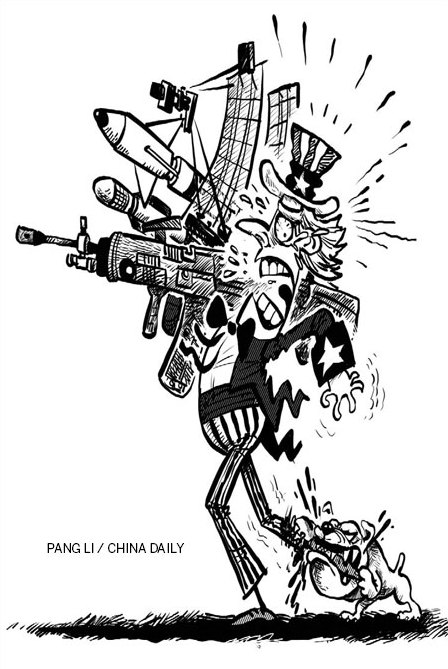
26 Apr, 2013
Flawed U.S. Terrorism Policies will Create Long-term Problems, with Limitless Costs

Police later identified two brothers, Tamerlan Tsarnaev and Dzhokar Tsarnaev, ethnic Chechens who migrated to the US more than a decade ago, as suspects in the Boston bombings. Tamerlan was later killed in a shootout with police and Dzhokar was arrested after being cornered in a boat in the Watertown area of Boston.
The injured suspect has told interrogators that he and his brother acted alone and without the help of any foreign terrorist group, and were driven by hard-line Islamist views and anger over the US wars in Afghanistan and Iraq, US officials said Tuesday.
Since the bombings took place at a sensitive time, when the US has accelerated the withdrawal of troops from Afghanistan and is reducing the scale of the war on terrorism, it will affect US President Barack Obama’s counter-terrorism strategy.
The Boston bombings show that only keeping a close watch on foreign terrorist groups and using the global anti-terrorism campaign to advance its geopolitical interests cannot solve the US’ domestic security problems. To prevent attacks by foreign terrorist groups, the US has established detective and control networks that enable intelligence authorities to issue early warning against threats by monitoring the Internet, tapping phones and analyzing clues overseas.
Possible attacks on the New York subway in 2009 and Times Square in 2010 could be averted because of the rich experience the US has gathered in guarding against al-Qaida and other foreign terrorist groups. But the result of the US’ attempt to eliminate domestic terrorist threats has been limited despite the large inputs.
That a pressure-cooker device was used in the Boston bombings suggests terrorists do not necessarily need a backup foreign network to launch an attack. And since al-Qaida is exhorting youths within the US to carry out low-level, “leaderless” attacks, people could learn from materials available online how to turn a pressure cooker into a bomb.
In fact, the threat of a terrorist attack on the US from abroad has reduced and the fear of attacks engineered by people within the country has increased since Obama assumed office in January 2009. It is in this context that the Boston bombings should be seen.
Despite expediting the troop pullout from Afghanistan and reducing the scale of the war on terrorism, the US didn’t shift the focus inward to eliminate terrorism. It seems the US cannot attend to one thing without neglecting the other because domestic terrorist threats have intensified while foreign ones are yet to be eliminated. The Boston bombings are another reminder that the terrorist threat is far from over, which is real and urgent than the so-called threat emerging powers pose to the US. So it’s time the US reviewed its security strategy to boost domestic security and promote international cooperation against terrorism.
The US may increase expenditure on domestic counter-terrorism campaigns and strengthen vigilance in public places and public transport. On one hand, the serious polarization of the rich and the poor in the US, and political and ideological conflicts, coupled with the emergence of some extremist groups, could provide the ideal breeding ground for terrorism on American soil. On the other, the Republicans may take the opportunity to attack the Obama administration’s counter-terrorism strategy, and domestic security and counter-terrorism issues will be high on the US’ foreign and security policy agenda.
It seems the US faces a long-term problem of boosting domestic security and preventing terrorist attacks because the strength of terrorists and the anti-terrorism forces is asymmetrical. The cost of an anti-terrorism war is limitless. Besides, increasingly closer monitoring of the Internet and other communication channels, and some security procedures have eaten into the liberty and privacy of Americans. As a result, Americans face the dilemma of having more security at the cost of privacy or having more privacy at the cost of security.
With the US’ accelerated troop withdrawal from Afghanistan and the strategic contraction of the country’s anti-terrorism front, the fear of terrorists getting stronger in Central and South Asia is increasing. And the situations in Iraq and Syria are proof that such worries are not unfounded. Therefore, the US has to find ways to deepen international cooperation in order to build a new united front against terrorism.
The author is director of the Center for Counter-terrorism Studies at the China Institutes of Contemporary International Relations.



Liked this article? Share it!